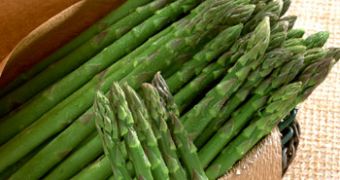A few days ago we were talking about the current "all-natural" dietary trend and the fact that present-day healthy eating regimes tend to be built around certain "super foods" (as they are playfully nicknamed) which contain high doses of beneficial nutrients and help our bodies fight diseases and stay younger for longer. So far, we discussed the amazing nutritional properties of almonds, figs and kiwifruits; today the time has come to add yet another super food to the ever-growing list of everyday essentials: asparagus.
Many of us don't know it, but the delicious and succulent asparagus spears have enjoyed a privileged position among the world's culinary delicacies since ancient times. Just one serving of the fleshy green vegetable supplies about 66% of the recommended daily dose of folate, which is absolutely essential for the wellbeing of the cardiovascular system. So much so, in fact, that doctors estimate that a daily intake of 400 mcg of folate every day could help cut the number of heart attacks by 10% each year. Which means that a daily dose of asparagus is not only a delicious treat, but also a safeguard against heart disease.
Asparagus is also a natural diuretic, due to its high contents of minerals (it contains potassium and little sodium). Along with asparagine, which is an active amino acid, they make asparagus a very good diuretic, despite the unfortunate urinary smell that is sometimes associated with it. It's also been known to alleviate arthritis and rheumatism and has been deemed useful for PMS-related water retention. Asparagus has also been proved to contain an articular type of carbohydrate called inulin, which is very beneficial for the friendly bacteria in our large intestine (such as Bifidobacteria and Lactobacillii). Finally, if you're pregnant, a cup of asparagus each day (particularly in the first trimester) will lower the baby's chances of developing birth defects.

 14 DAY TRIAL //
14 DAY TRIAL //